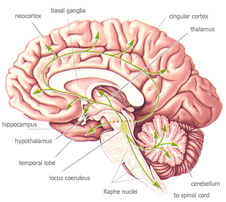Intro l
Brain l
Sensation l
Revolution l
NeuroPhilo l
Epilogue l
Biblio
Neurophilosophical Inquiries

©
2025 by
Wim van den Dungen
from : the living
brainmind
to : the imaginal mindbrain,
an evolution ...
Preface
In a few specific areas of investigation, philosophers are confronted
with the brain :
• the relationship between the brain & the mind ;
• the distinction between perception & sensation ;
• the question of how religious experience roots in the CNS ?
In what traditionally is called the "body/mind problem", philosophers
tried to explain how a non-material, non-spatial mind or "conscious
thing", characterized by (a) the "unity of apperception" or the unified
nature of the manifold of perception & mentation and (b) certain unique
features such as (self)consciousness, awareness, intention, presence & sense of identity
-feeding negentropic process-, relates to the material, spatio-temporal
brain or spatio-temporal "extended thing" ? The latter features a non-centralized
neuronal activity & plasticity, and responds to physical laws.
Thinking these relationships between mind & body,
philosophers are confronted with the necessity to study the brain.
Today, it is fashionable for scientists & philosophers to adhere to the materialist tenet according to
which the mind is merely produced, caused, secreted, generated etc. by the brain.
The mind is merely an emergent
property of neuronal activity.
This position has two severe problems, for (1) it
cannot explain the unity of the manifold of conscious objects (the
binding problem), nor (2) the functional differences between states of
matter and states of mind (the asymmetry problem), leading to
unacceptable consequences. If the unity of apperception (of sensate &
mental objects) cannot be explained, then how to understand responsibility,
free will & accountability ? Can the sentence "He is a murderer." have
any meaning if it remains unclear who this "he" is ? If
self-identity has no ontological status (the "I" can nowhere be found in
the brain), then for the materialist the whole notion of a responsible
agent becomes problematic, endangering ethics.
If the mental realm is
unlike the physical, but indeed caused by the latter, then the emergence
of the non-material out of the material needs to be explained, which
fails. This last objection strikes at the heart of the materialist tenet
: how can materialism, resulting from a self-reflection, explain this
ability of the mind to watch itself without stepping outside the
limitations imposed by the physical ? An objection already found in
Greek philosophy.
The author tries to bring together arguments backing the case of
interactionism, designating separate functional categories to both brain
and mind, explaining how both interact. This allows for an important
ontological difference to be made between matter & consciousness,
between neuronal processes (both inside and outside the brain) & states
of mind (clear awareness of sensate or mental objects). This leaves both
physics & the human sciences intact.
From another vantage point, the neurophysiology of perception &
sensation has consequences for epistemology and thus for the correct
approach of scientific knowledge, demarcating it from metaphysics. This
leads to the study of the sensory apparatus, the pre-thalamic processes
& the post-thalamic cortical projections. Sensations are always
conscious and bound to mental designation (labeling). Perceptions are
pre-conscious and devoid of any such attributing activity. For example,
eye-consciousness does not "see" perceptions, or the retinal
transduction of electro-magnetic radiation into electrical impulses, but
only what has been projected by the thalamus in the primary sensory area
of the neocortex and subsequently interpreted by various cortical
systems (secondary & tertiary areas, gyri, prefrontal lobes, etc.).
S(ensation) = P(erception) . I(nterpretation), with I ≠ 1.
Finally, can the brain be trained & perfected ? In what way does the
proposed interactionism trigger changes in the brain resulting from
volitional mentalities ? Are altered states of consciousness, as
evidenced by parapsychology, anthropology, comparative religion,
Shamanism, Yoga & mysticism, computable by the brain ? How to integrate
recent psychosomatic sciences & biofeedback ?
To further explore the contents of these studies, click
here.
|


